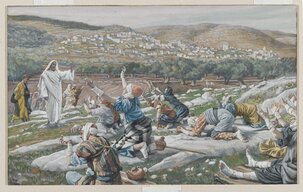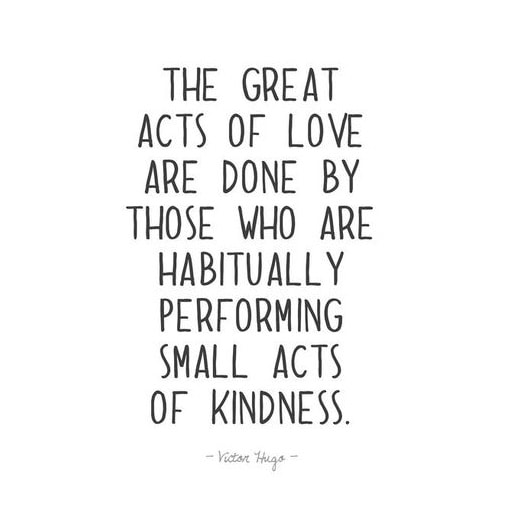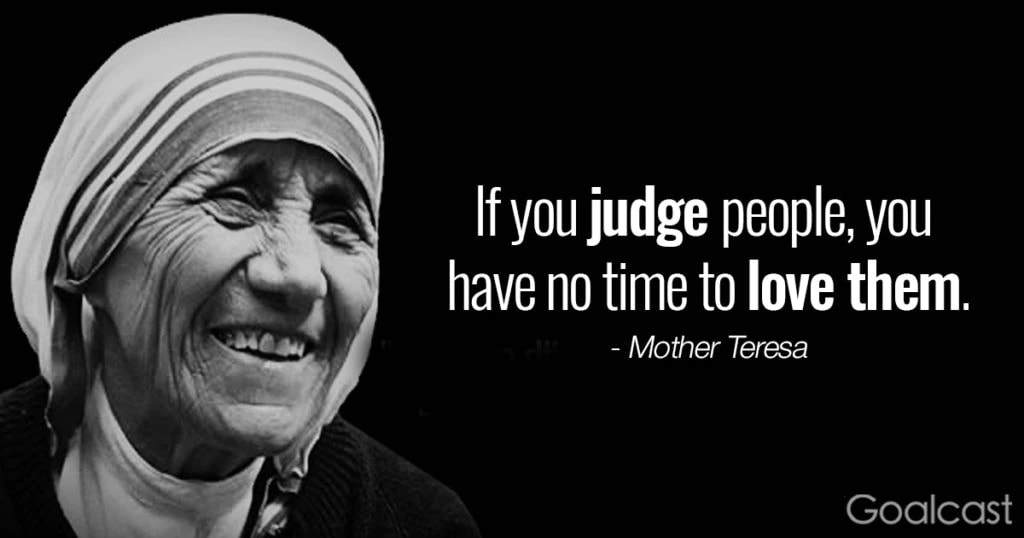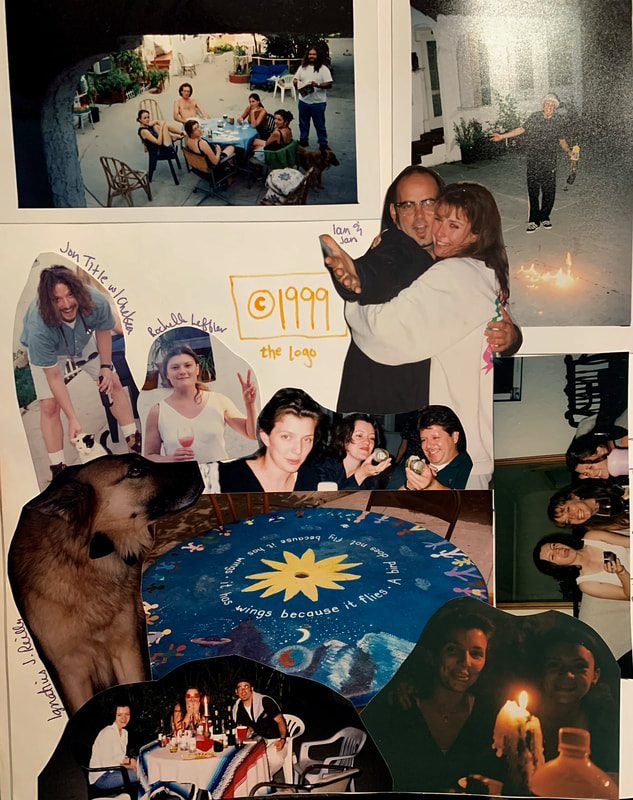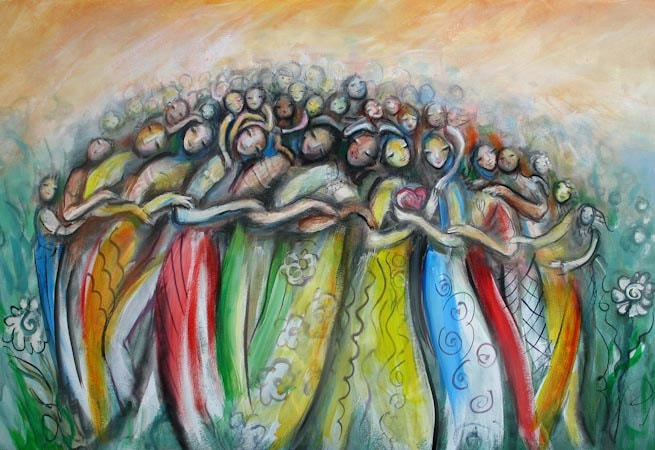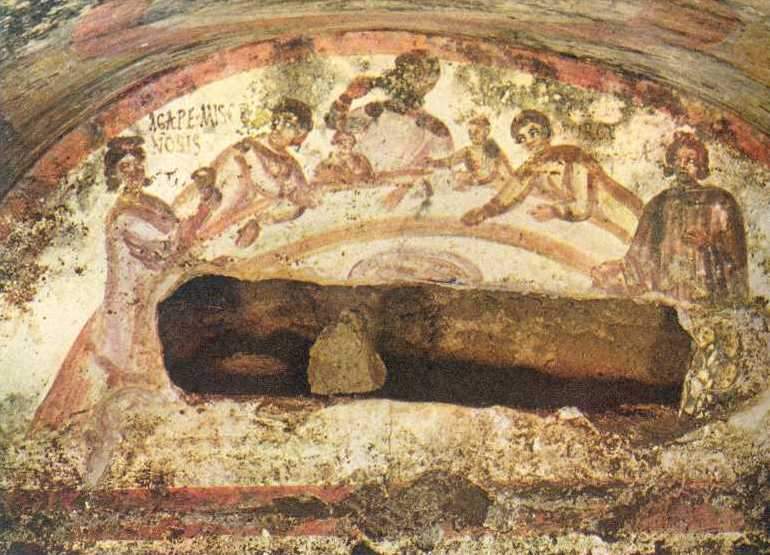“They praised God and demonstrated God’s goodness to everyone.” From the Acts of the Apostles 2:43-47
Over the last four weeks we’ve learned that God did some really cool stuff through the Apostles that left people in awe. This caused people to want to be a part of their new way, and soon they built a community where all things were held in common.
Everything they did seem to be a holy task because everything they did was grounded in Christlike love. Moreover, all this was done so that all people would come to see the presence of God all around them. They did this, as Luke writes, by demonstrating God’s goodness to everyone. While you might think it’s impossible to do great miracles or crazy to pool your finances into a common bank account, any one of us is capable of demonstrating God’s goodness. And in doing so, even pull off a few miracles or at least make sure everyone is taken care of. Our first question then is simply: What is the goodness of God? The easiest way to describe it is to say it’s God’s very essence.Goodness is who God inherently is. God is the original source of goodness. It’s not like it first came from something else. So we say, God is good. As creatures made in God’s image, this means we too are inherently good. The first chapter of the bible tells us, “God saw everything he made; it was supremely good” (Genesis 1:31). At times you might not think this about yourself or others. But like the psalmist reminds us, “The Lord is good to everyone and everything. God’s compassion extends to all his handiwork!" (Ps. 145:9). We don’t earn God’s goodness. We are made in it; whether we think we’re worthy of it or not.
Watch the message here
Now you might be thinking, if this is true then…why is it so hard to see God’s goodness in our world today? Outside this horrific pandemic that is killing so many of God’s children, we still have war, famine, poverty, mass shootings, personal assaults, police brutality, racism – the list these days seems endless. You might be wondering, “Why doesn’t God do something about it?”
What if God did do something, and is waiting for us to respond? Imagine seeing a love one suffering, what should you do? Ignore them and their pain? Or sit with them and tend to whatever it is that is causing them hurt? Whenever we enter into such a place, God’s goodness is able to shine. This is what we are called to do, as individuals and as a church; to be the visible presence of God’s goodness. God has made us good, but it’s up to us to live into it. And we have no excuse not to. In Jesus, God’s divine goodness became flesh, so we’d have a living example on how to live into our true selves. If you want to know what to do, simply see what Jesus does and do that. As Christ followers, we should make every effort to be like Jesus – loving others, being generous, and doing good. Like Peter points out, we have a responsibility to show others the goodness of God as it flows in and through us (1 Peter 2:9). This should be the distinguishing mark of Christ’s church - to be living examples of God’s goodness. So why then is it so hard to see God’s goodness in our world today?
Such miracles of love happen all the time – in our houses, and workplaces, and all around our communities. They happen as we listen to someone complain without judging them for doing so. They happen every time we check in with our neighbors who live alone. They happen when you support a local blood drive or volunteer to deliver food for Meals on Wheels. They happen every time you work in your community to create programs that plant more trees or offers safe havens for the homeless, or vote for a candidate who believes in strengthening gun control laws.
From the ordinary to the extraordinary, God works miracles through us to spread divine goodness into the world. It happens every time we choose to show love. We are God’s ambassadors, co-laborers in God’s kingdom. Just as we are made from love, we are made to give it away. Christian faith is not about waiting for God to act, it’s about taking action in God’s name – opening our hearts, our hands to bring God’s love to light just as Jesus did and called us to do as well. Imagine the radical impact we can have on our communities if only we would respond to Jesus’ call to be a living, breathing example of God’s goodness in the world. We can sit around waiting for God to act. Or we can say yes to God who acts through us to transform the world. This takes us back to that question of “Why does a God who is so good and loving allow bad things to happen?” Every time I get this question I answer honestly, “I don’t know. But I suspect God could ask us the same question. Why do we allow it?" God is waiting on us, to speak goodness into impossible situations. God is waiting on us, to do good things that help the oppressed, hopeless, and lost. God is waiting on us, to cherish all of life so that all things can sing of God’s glory. God is waiting on us, to be like this early church who like Jesus himself, would become the visible presence of God’s love and grace in the world. God is waiting on us to share ourselves, our resources, our time and our hearts with one another. There’s this prevalent belief that there’s not enough to go around. It’s not that there isn’t enough to share, but that there is too much greed and not enough love. The love of God given to us through Jesus Christ does not weigh and measure its portions, it just gives. Through Christ, God pours goodness into us until it spills out of us … all so that others can see and believe. Mother Teresa upheld that belief faithfully as she devoted her entire life to caring for the neediest and most vulnerable of the world. Her work and love ethic remind us that, “Love cannot remain by itself – (otherwise) it has no meaning. Love has to be put into action, and that action is service.” Through her endless acts of faith, Mother Teresa was able to encounter God in the poor, sick and dying. As she once said, “Not all of us can do great things, but we can do many small things with great love.We may not have the ability to feed a hundred people, but we can feed one.” We may never encounter a leper whose wounds need tending, but each one of us knows someone whose broken heart needs mending. Mother Teresa would come to realize, the great paradox is this - “If you love until it hurts, there can be no more hurt, only more love.” And so I leave you with this reminder: Wherever our love is present, so too is God’s goodness. We are made from love for the purpose of love. “At the end of life we will not be judged by how many diplomas we have received, how much money we have made, how many great things we have done. But by Jesus who said “I was hungry, and you gave me something to eat, I was naked and you clothed me. I was homeless, and you took me in.” As followers of Christ, we must never forget that whatever we do to one another, we do also to our Lord. “If you love me,” said Jesus, “then you will love one another.” Love is the goal. Love is our purpose. It’s how people will see our faith and come to know us, as individuals and as a church community. As we enter Anamesa, as we move in that space between us and the other, we must do so by sowing the seeds of God’s love. When others divide, we must unite; creating communities of care. When others hoard, we must help; sharing the gifts and blessings we have received. When others deceive, we must stand up for truth; demanding fairness and justice for all so God’s glory can shine forth through and from all people. When others are uncaring and overwhelmed, let’s be kind and respectful; loving fully and faithfully as if we are loving Christ himself. This is God’s goodness at work through us. This is how people will notice us. This is God becomes glorified. And the church becomes the living, breathing body of Christ. “And day by day, God adds to the number of people being saved.” Work Cited: Kubrick, Kirk Allen. The Fourth Sunday of Easter Is. April 13, 2008 (accessed on June 25, 2021). https://www.allaboutgod.com/goodness-of-god.htm https://www.coraevans.com/blog/article/10-mother-teresa-quotes-on-service-to-make-you-think
0 Comments
Day by day, as they spent much time together in the temple, they broke bread at home and ate their food with glad and generous hearts, praising God and having the goodwill of all the people.
To begin I should acknowledge that it’s Father’s Day. We each have one. Whether or not we know him, acknowledge him, love him or like him we are here today partially because of him.
I love my dad fiercely. He's been a great father, mentor, and teacher. If you Google him, you’ll see that he was once a pediatrician among other things. As a doctor, he was always “on call” often rushing to the hospital to welcome a newborn baby. It wasn’t uncommon for him to miss dinner. I mention this because when I was 10, my dad built this crazy dining room table out of these heavy wooden planks taken from an old ship. We still eat dinner from this table whenever we visit my parents. To this day, every meal at that table begins with a blessing of the food, followed by some story telling, laughter, and a few arguments thrown in for good measure. During these heated debates, if my dad were there, he’d quote Jesus. It wasn’t the golden rule. Or the verse about turning the other cheek. It was the one where Jesus says, “Where two or three are gathered in my name, I am there among them” (Mt. 18:20). I don’t remember if this ever stopped us from fighting, but it forever changed the way I look at that table - as a place to meet Christ in the flesh. Like the two faces hidden in that black and white picture, Jesus has been there all along. But it took my dad pointing it out before I could really see what that meant.
watch the message here
In thesefive short verses, Luke shows us how Christ was present, in and all around these faithful believers – from the miracles they performed to their most mundane daily activities. Wherever, or however, they came together they believed Jesus was in their midst. This allowed them to make every place holy, and every act sacred.
As Wendy Joyner notes, “These early believers opened themselves to God’s presence by being attentive to the seemingly small and sometimes mundane parts of daily life.” Luke makes it a point to tell us that a simple act like eating dinner could lead others into a deeper relationship with God through Jesus Christ. What this tells me is that whether you are praying or washing the dishes or pulling weeds from your garden, God is with you when Christ is in you. While looking at sacred practices in everyday life, Tish Harris-Warren writes, “How I spend this ordinary day in Christ is how I will spend my Christian life.” Her words challenge us to ask ourselves, as individuals and as a church, what parts of our lives are bearing witness to Christ? And in what areas do we lack? Are we living into our faith in such a way that others will see the Christ in us and want to become a part of his holy body? I think this is what my dad was trying to get us to see every time we fought with one another. As they came to better understand the Christ in them, and to see the Christ in others, this new community of believer were no longer afraid to show their faith. Instead, they made sure “it permeated every aspect of their lives as they acknowledged God in everything.” (Byrd) By their acts of generosity and devotion, people and communities were transformed. And the Church began to flourish. If only today’s church still looked and acted like it first did. Instead of being a community living out its faith in imitation of Christ churches try to mimic successful businesses. We want our ministers to be more like CEO’s and less like shepherds. When I took my first call, the search committee was super excited that I had a corporate background. One member went so far to suggest that I run the church office like he ran his company. He wanted it to be profitable and not prophetic. I know in their hearts they loved the building and had a great desire to keep the church doors open. But here’s the thing. They had focused so much on the building that they had forgotten what it meant to be a church...a community gathered for the common good of God’s kingdom where the more you have the more you give away.
A long time ago, I moved into a small apartment in Hollywood. I wasn’t sure if I was going to take the place until I was greeted by beautiful young woman who would eventually become my wife. But there was something else that was special about the Formosa Ponderosa as we liked to call it.
It would take me a few months before I could see that it was more than a bunch of rundown bungalows. There was something holy and divine that was real and present.
(We shared whatever was in our cupboards and refrigerators. Eating off mismatched plates, we passed around bowls of salad and sympathy, and platters full of pasta and promise. We filled our wine glasses with hope and tears, and laughter and pain.
For me, and many others, this was our church. Or at least how we imagined church should be. A place of hospitality, grace, and peace. It was inclusive and affirming. A safe haven to be – whether that meant being sad, confused, frustrated, or in the spotlight. At every meal, love was savored like the most delicious cut of beef money could buy. Kindness was offered with such gentleness and delight that no one dared to spill a drop. This was our universe. It was our church, whose pews were a hodgepodge of abandoned chairs. Whose altar was adorned with dirty ashtrays and mounds of old candle wax encircled by children holding hands. In this sacred sanctuary, we confessed to one another and dispensed forgiveness like salt from a shaker. We played music, sang songs, told stories, and always put the needs of others before our own. Dinner was a true form of worship. With each meal being the holy Eucharistic as God’s love became incarnate in us, through us and all around us. It was right there, in the flesh, for me and anyone else to see, feel, touch and taste its goodness. Like the table itself, we came from different places but shared the same love. Love for our time together. Love for all our pets, gardens and assorted house plants. Love for our joys and broken hearts. And our love for cards, dominos and beer. (We really loved other spirits too.) We loved all who came to visit. But most importantly, we loved one another. No matter what. This was our blessing because we often had trouble loving ourselves. This was church when church was good. Every time I enter that sacred and holy space, I could hear my father’s voice and see Christ sitting across the table from me. As we fed one another the spiritual food of God’s unconditional love, my personal faith began to grow again. Soon I found myself stepping back inside an actual church building. And before knew it, the church would literally become my home. These first believers won people to Jesus because of their faith and devotion to one another. They showed it by sharing grace, love, joy and peace. And yes, by sharing a simple meal. It all started with Jesus, who sat at the table with his disciples to share what would be their last supper together. It was there he left them, not with doctrine or some creed to recite. Instead, like N.T. Wright points out, “He gave them a job. He gave them meal to share.” The Church is not a building, or a right theology. It is the living body of Christ. It is people who gather together, in his name; a community who lives out the gospel in every aspect of life, so others may come to see God’s glory. The early church teaches us how to put our faith into practice – be it an ethic, an economy, or a culture. These few verses show us how living as if Christ is among us can actually transform us and others. It can change the way we respond to the needs and challenges of our community. (Bartlett) They gave us a new way to see the everyday. And showed us how something as basic as eating a meal together can be a spiritual activity. As Christ’s body, we are led by his heart to live a life of love whether we are folding laundry or holding the hand of a heartbroken friend. Whenever or wherever we gather, when the love of God is revealed through us – Jesus becomes visible. People take notice. God becomes glorified. And the church comes to life. “And day by day, God adds to the number of people being saved.” My father was right. Where two or three are gathered in the name of Christ, love and peace will be found. Work Cited Bartlett, David L and Barbara Brown Taylor, eds. Feasting on the Word, Year A, Vol 2. (Knoxville: Westminster John Knox Press, 2010. Byrd, Joseph. Anatomy of a Spirit-Filled Church, Abingdon Preaching Annual 1999 (Nashville: Abingdon Press, 1998). Harris Warren, Tish. Liturgy of the Ordinary: sacred practices in everyday life. (Downers Grove: Intervarsity Press, 2016). Joyner, Wendy. Day by Day, Abingdon Preaching Annual 2002 (Nashville: Abingdon Press, 2001). Shauf, Scott. Commentary on Acts 2:42-47. May 11, 2014 (accessed on June17, 2021).
From clothing to technology to setting up our single friends, we humans love to put things together. We do it with marriage. Or grouping people by age or skill level. Every time I get in my car, my cellphone automatically pairs with the radio. Society is obsessed lately with proclaiming which binary system they belong to. Race, nationality, gender, sexual orientation, special interests, and even by our love of sports. I’m a Dodgers fan. My wife likes the Giants. And some how we’ve stayed together. Which isn’t always the case with some.
When we lived in Michigan, it was not uncommon to see a single mitten in the snow, which everyone knows only ruins a perfect pair. And for years I would name my socks, so that I could make sure the two which came together … stayed together. I like to think that is why we were made in God’s image. So that we would be forever connected to our creator. As the Apostle Paul put it, “I am convinced that nothing can ever separate us from God’s love.” (Rom. 8:38) After doing a little word searching, I learned the word “pair” is derived from the Latin word “paria” which means equal things. This is a no-brainer if you’re talking about a pair of socks. It gets a little more complicated when it comes to people. The Corona Virus helped us see how unequal the world and even our own communities are. Many of us don’t want to come together - not even when there is a vaccination that can stop the virus from shutting us down, and claiming more lives. All signs point to some normalcy if we can reach herd immunity. But this will only happen if we work together.
watch the message here
“And all who believed were together and had all things in common. They would sell their possessions and goods and distribute the proceeds to all who had need.”
It’s hard to imagine a group of people living together in wonderful harmony, sharing everything. This idea not only continues to upset many religious leaders. But also, a big group of politicians who claim the name of Christ. They want you to believe this is socialism, or some corrupt system, and not the very thing that the church was and is to be built upon. Now before we get on our own high horse, I should point out that I haven’t seen anyone from this humble house church hustle to sell their prized possessions so that everyone can be taken care of. But that's exactly what this new church did. They built their faith upon a communal life where the rich gladly sold property and shared with the needy. They came together not as collaborators, co-workers, or church friends, but as equal partners for a common purpose. To share the gospel like Jesus did, in all the ways they lived it in the world. Together they created a community committed to supporting one another in fellowship and prayer; sharing their goods, talents, pain, and joy. Bound by a single heart and soul, they lived in anamesa, that space between the earthly and divine. By looking to them and the examples they gave us, we too will understand how to be a new kind of community, and how to thrive in that space between where God comes to meet us. We sometimes think because we gather in different places that we’re really not together. Pre-pandemic, I was told by other ministers that this is not really a church… but a show. But togetherness is about a new kind of family, not some old facility. It’s not about being in the same workspace, schoolroom or even church building. It’s about making a choice to share the joys of our hearts and bear the pain of our souls. This is how the divine breaks into our everyday earthly world – when we choose to be together for something greater than ourselves. While the pandemic kept most of us away from one another, we still found ways to be together, didn’t we? We came together on Sunday for worship. And Tuesday for bible study. I know many of you also reached out to others who were sheltering in place. You shared stories and feelings, and some of you even prayed with them. The Bible says, that’s church. There were times that we dropped food off to our neighbors and shared our avocados with people who passed by. Some even dropped off loaves of fresh baked bread to our house. That’s church. As the pandemic lingered on, we kept an eye on people’s social media accounts to make sure they were managing and coping well. That’s church. We video chatted and lived streamed so people would feel connected. Though it’s not the same as being face-to-face, it’s church nonetheless. This pandemic taught me that while we have been apart, we were never alone. In Christ we are always together. He is our proof of how far God is willing to go to love us and be with us. And nothing, not time or space, virus or death can stop this divine relationship from happening. These first Christians were compelled by God’s love and desire to be with them. They understood that they were better together – deeply connected through this love and a shared conviction that changed lives and transformed the world around them. As we transition into The Anamesa Communion we need to look at how our separate churches will come together, in that space between where God comes to meet us, despite being physically apart. This first church grew out of the rich faith these early Christ followers showed. Together they devoted themselves to the apostles teaching and fellowship, worshipped at the temple, ate their meals, and prayed with one another. It was not faith alone that helped them grow, but faith practiced together, as one body sharing one heart. They came together, as equals, to proclaim the good news of God’s redemptive love because they knew, firsthand, the effectiveness of love’s power to transform the world. Love is the bridge that connects heaven to earth, us to them, me to you. Togetherness is built on love, not location. It’s forged by God’s love for us and how we respond to that love in the way we share it. As Jesus himself showed us, love is the most dangerous part of our faith because it requires us to be vulnerable, completely unguarded, raw and a willingness to risk being hurt. Divine love is risky for those who choose to accept it. And yet, as Jesus showed us as well, it is also the most rewarding. Out of love, the rich sold what they had… which made them vulnerable to losing their status and power in the world. What they gained was priceless, worth more than anything their money could buy. Out of love, the community gave away what little they had to ensure no one was without. And the more they gave, the more God added to their numbers. Out of love, drunks, hookers, abusers, thieves and swindlers were forgiven. What looked like foolishness and folly to the world, has been God’s plan since the beginning. Love is the bridge that bring people together. But it’s forgiveness that gets people to cross it. Jesus redeemed the world back to God by loving us and forgiving us of our transgressions. As his followers, his church and body, we too are called to do the same. Togetherness is about our conviction, and the character by which we confess Jesus as Lord – the basis that makes our church the church. We declare this simple truth every time we share the joys and pains of a common life together. And it comes to life every time we give and receive love. To quote Pope John-Paul II who once said, "Nobody is so poor that he or she has nothing to give, and nobody is so rich that he or she has nothing to receive." His words offer us a powerful reminder of who and what the church is. The body of Christ that gives itself freely, even to the point of death on a cross. These words also remind us of where the church is. Here, in our hearts. Just as we receive God’s love we have been chosen and blessed to give that love away – no matter where we are, no matter the cost. By this simple act the threads of our separate, private lives are woven together into a fabric of true fellowship in which Christ makes all things new. On earth. And in ______? heaven. Now. And _____? forever. Amen. Work Cited Bartlett, David L. and Barbara Brown Taylor, eds. Feasting on the Word, Year A. Vol 2. Louisville: Westminster John Knox, 2010. Byassee, Jason. "Living in the Word: To all the world" Sojourners, May 2017: 44. Kim, Ray. The Power of Togetherness. deepspirituality.com. April 8, 2021 (accessed on June 11, 2021). Moore, Charles. Called To Community. Walden: Plough Publishing House, 2016. From Brian D. McLaren's book Faith after Doubt: Why Your Beliefs Stopped Working and What to Do about It "Before doubt, I thought that faith was a matter of correct beliefs. My religious teachers taught me so: that if I didn’t hold the right beliefs, or at least say that I held them, I would be excommunicated from my community, and perhaps, after death, from God’s presence. They taught me this not to be cruel but because they themselves had been taught the same thing, and they were working hard, sometimes desperately, to be faithful to the rules as they understood them. I tried to do the same, and I would still be doing so today if not for doubt. "Doubt chipped away at those beliefs, one agonizing blow at a time, revealing that what actually mattered wasn’t the point of beliefs but the clear window of faith, faith as a life orientation, faith as a framework of values and spirituality, faith as a commitment to live into a deep vision of what life can be, faith as a way of life, faith expressing itself in love.
"For all those years, when I said, “I believe,” I thought I understood what I was doing. But more was going on, so much more...Looking back, I now see that underneath arguments about what I believed to be true factually, something deeper and truer was happening actually. For example, whether or not the creation story happened factually as described in Genesis, I was committing myself to live in the world as if it actually were a precious, beautiful, meaningful creation, and as if I were too... "What mattered most was not that I believed the stories in a factual sense, but that I believed in the meaning they carried so I could act upon that meaning and embody it in my life, to let that meaning breathe in me, animate me, fill me... "Whether I considered the stories factually accurate was never the point; what actually mattered all along was whether I lived a life pregnant with the meaning those stories contained. To my surprise, when I was given permission to doubt the factuality of my beliefs, I discovered their actual life-giving purpose... "Doubt need not be the death of faith. It can be, instead, the birth of a new kind of faith, a faith beyond beliefs, a faith that expresses itself in love, a deepening and expanding faith that can save your life and save the world." McLaren, Brian D. Faith after Doubt: Why Your Beliefs Stopped Working and What to Do about It (St. Martins: 2021), 206, 207, 212.
Since I was deep into procrastination at this point, I decided to log into the account, and add some new content to see what would happen. Within a day, I had received a message from someone who was looking for a church. I promptly called the number and told her that we are a group who does church a little differently. I explained what that meant, and I’m not surprised she hasn’t called me back.
Although the pandemic forced a lot of preachers to preach from home, house churches are still a bit of an oddity. This wasn’t always the case. The first churches began in houses like ours. The reason for this could have been because empty buildings and move-in ready temples were hard to come. And perhaps the apostles knew they could do better things with their money than take on any unnecessary overhead. Another reason they gathered in houses was because Christianity was illegal. It took courage to live one’s faith out in public like the apostles did. But as they lived out their faith, the Holy Spirit began to do some amazing things. It didn’t take long for people to notice. And here’s what happens next. READ: Acts 2:43-47
watch the message here
Awe is defined as a feeling of reverential respect with fear or wonder. Biblically speaking, awe is often translated as fear. For example, Proverbs states, “the fear of God leads to knowledge.” But who wants to worship a God they are afraid of?
A better translation would be “to be in revenant awe of God leads to knowledge.” Not only does it point us towards a positive understanding of God’s way of doing things. But it also welcomes us to understand ourselves in God’s expansive and everlasting love. Take a moment to think about a time when you were in awe of something or someone. What was the last thing that blew your mind? Or left you with a heart full of wonder and amazement? A big awe moment for me happened while hiking the Narrows in Zion National Park. If you’ve been there, you know the Narrows isn’t a trail but a bed of slippery rocks. And those rocks are hidden under the cold currents of the Virgin River that has cut a very narrow valley in the middle of the national park. On either side of me hung these massive, colorful walls that towered up to the sky. At every bend, I would stop and silently stand in the water completely awestruck by the majestic grandeur of this awesome place aptly named after the kingdom of heaven. It was there I was reminded that wherever God’s divine hand is present, awe happens. After all, you can’t have awesome without awe. When the people saw the way the apostles lived, they were in awe. And wanted to be a part of it. These few verses ought to challenge the church today. They should make us all look at how we live out our faith in the world. And to ask ourselves what we’ve done lately that has left people filled with wonderment? What could we do? Luke tells us the apostles amazed people by doing many “signs and wonders.” We don’t if this means they were doing miracles - like healing the sick and raising the dead. Or if it was simply in the way they were caring for one another the way they live as a faith community built upon God’s love and compassion. Imagine what people might say about us, if we lived together in harmony, pooling our resources so no one would be without. What would this church look like if we truly cared for one another, shared our meals together, laughed and cried together, and lived a life in such kindness that it sang God’s praises? This is how the first church left the world in awe. And it’s how we too can be awesome. Compassion. Kindness. Harmony. Giving of our heart and more. This is the biblical blueprint we are given to make awe awesome. When Kathleen and I were first thought about being a church plant we knew we didn’t want to be “the church.” We just wanted to be “church.” We decided to be a place that emphasizes less about showing up on Sundays to hear the gospel, and more about showing up every day to be gospel. A place to practice what we preach. When we asked others to join us on this adventure, many came, but only a few stuck around. This was hard for us, on many levels. But then again, Jesus never said it was going to be easy. Perhaps that’s why so many churches have become buildings and institutions instead of a way of life. In these few verses we’re given an idyllic reminder of what Nadia Bolz-Weber calls our “10-minute hippy phase” when the church was more like a short-lived utopian commune where everyone’s needs were met. Somewhere along the way this holy body got lazy and unfocused. Instead of being like Jesus, we’ve made Jesus like us. Neal Cole describes today’s church like a place suffering “the slow decay of someone with Alzheimer’s disease.” We slowly have forgotten who we are and what our lives are all about. We are the body of Christ. And as his body, we are “a living organism, not a building, a dogma, or static institution.” Throughout the gospels, Jesus calls us living seeds and living stones; yeast that is active and alive; salt that is full of flavor; light that awakens the world. This is how we awe. This is how we awesome. By being like him. The first disciples followed Jesus’ lead. And God blessed them day after day. They lived like Jesus. Prayed like Jesus. Practiced mercy and grace and forgiveness like Jesus. And God added to their numbers. They took the awe of Jesus and made awesome everywhere they went. Jesus is not calling us to be a religion, but to be his living presence in the world; to proclaim the gospel by being the good news of God’s redemptive love – making justice, equality, unity and peace our highest priority. Our real power doesn’t reside in the number of people sitting on pews; our real power comes from the number of people we awe by living into our most awesome Christlike selves. When we live in harmony with one another...awe becomes awesome. Whenever we wait for one another; stand by each other; bear each other’s burdens; comfort someone in need and build one another up...awe becomes awesome. Awe happens when we’re at peace with ourselves and with one another. Awesome happens whenever that peace is shown in all the ways we love and show kindness. Awe is found in forgiveness. Awesome is found in hospitable and humble hearts willing to be vulnerable and inclusive. Jesus is not calling us to be a building, or a specific liturgy or tradition. He is calling us to be like him. What our structures or service looks like is second to who we are called to be like – the Master carpenter who constructs in us a new way of worshipping out of a radical way of living. Whether it happens in a backyard, or online, or out of a car filled with corn, God has given us the Holy Spirit to empower us so we can go out into the world and be amazing. This is my charge for you: Go now and be awesome by stepping out into your Christlikeness and to do so in such a way that people can’t help but be left awestruck. This is how God adds to our numbers, day after day, year after year. As it was in the beginning, is now, and forever shall be. World without end. Amen. Works Cited Cole, Neal. Organic Church: Growing Faith Where Life Happens. San Francisco: Jossey-Bass, 2005. Snyder, Howard. Called To Community. Edited by Charles E. Moore. Walden: Plough Publishing House, 2016. |
Ian MacdonaldAn ex-copywriter turned punk rock pastor and peacemaker who dedicates his life to making the world a better place for all humanity. "that they all might be one" ~John 17:21“Prius vita quam doctrina.”
~ St. Thomas Aquinas (1225–1274) * “Life is more important than doctrine.”
Archives
June 2024
|
